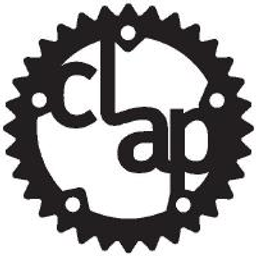Crate clap[−][src]
Expand description
clap
Command Line Argument Parser for Rust
Dual-licensed under Apache 2.0 or MIT.
- About
- Tutorial: Builder API, Derive API
- Examples
- API Reference
- CHANGELOG
- FAQ
- Questions & Discussions
- Contributing
- Sponsors
About
Create your command-line parser, with all of the bells and whistles, declaratively or procedurally.
Example
use clap::Parser;
/// Simple program to greet a person
#[derive(Parser, Debug)]
#[clap(about, version, author)]
struct Args {
/// Name of the person to greet
#[clap(short, long)]
name: String,
/// Number of times to greet
#[clap(short, long, default_value_t = 1)]
count: u8,
}
fn main() {
let args = Args::parse();
for _ in 0..args.count {
println!("Hello {}!", args.name)
}
}Add this to Cargo.toml:
[dependencies]
clap = { version = "3.0.2", features = ["derive"] }$ demo --help
clap [..]
A simple to use, efficient, and full-featured Command Line Argument Parser
USAGE:
demo[EXE] [OPTIONS] --name <NAME>
OPTIONS:
-c, --count <COUNT> Number of times to greet [default: 1]
-h, --help Print help information
-n, --name <NAME> Name of the person to greet
-V, --version Print version information(version number and .exe extension on windows replaced by placeholders)
Aspirations
- Out of the box, users get a polished CLI experience
- Including common argument behavior, help generation, suggested fixes for users, colored output, shell completions, etc
- Flexible enough to port your existing CLI interface
- However, we won’t necessarily streamline support for each use case
- Reasonable parse performance
- Resilient maintainership, including
- Willing to break compatibility rather than batching up breaking changes in large releases
- Leverage feature flags to keep to one active branch
- Being under WG-CLI to increase the bus factor
- We follow semver and will wait about 6-9 months between major breaking changes
- We will support the last two minor Rust releases (MSRV, currently 1.54.0)
While these aspirations can be at odds with fast build times and low binary size, we will still strive to keep these reasonable for the flexibility you get. Check out the argparse-benchmarks for CLI parsers optimized for other use cases.
Related Projects
- wild for supporting wildcards (
*) on Windows like you do Linux - argfile for loading additional arguments from a file (aka response files)
- clap_complete for shell completion support
- clap-verbosity-flag
- clap-cargo
- concolor-clap
- Command-line Apps for Rust book
trycmd: Snapshot testing- Or for more control,
assert_cmdandassert_fs
- Or for more control,
Feature Flags
Default Features
- std: Not Currently Used. Placeholder for supporting
no_stdenvironments in a backwards compatible manner. - color: Turns on colored error messages.
- suggestions: Turns on the
Did you mean '--myoption'?feature for when users make typos.
Optional features
- derive: Enables the custom derive (i.e.
#[derive(Parser)]). Without this you must use one of the other methods of creating aclapCLI listed above. - cargo: Turns on macros that read values from
CARGO_*environment variables. - env: Turns on the usage of environment variables during parsing.
- regex: Enables regex validators.
- unicode: Turns on support for unicode characters (including emoji) in arguments and help messages.
- wrap_help: Turns on the help text wrapping feature, based on the terminal size.
Experimental features
Warning: These may contain breaking changes between minor releases.
- unstable-replace: Enable
App::replace - unstable-multicall: Enable
AppSettings::Multicall - unstable-grouped: Enable
ArgMatches::grouped_values_of
Sponsors
Gold
Silver
Bronze
Backer
Macros
cargoAllows you to build the App instance from your Cargo.toml at compile time.
Deprecated, replaced with clap::Parser and clap::arg! (Issue clap-rs/clap#2835)
cargoAllows you to pull the authors for the app from your Cargo.toml at
compile time in the form:
"author1 lastname <author1@example.com>:author2 lastname <author2@example.com>"
cargoAllows you to pull the description from your Cargo.toml at compile time.
cargoAllows you to pull the name from your Cargo.toml at compile time.
cargoAllows you to pull the version from your Cargo.toml at compile time as
MAJOR.MINOR.PATCH_PKGVERSION_PRE
Deprecated in Issue #3087, maybe clap::Parser would fit your use case?
Deprecated, replaced with ArgMatches::value_of_t
Deprecated, replaced with ArgMatches::value_of_t_or_exit
Deprecated, replaced with ArgMatches::values_of_t
Deprecated, replaced with ArgMatches::values_of_t_or_exit
Structs
Build a command-line interface.
The abstract representation of a command line argument. Used to set all the options and relationships that define a valid argument for the program.
Container for parse results.
Command Line Argument Parser Error
Iterate over indices for where an argument appeared when parsing, via ArgMatches::indices_of
Iterate over multiple values for an argument via [ArgMatches::values_of_os].
A possible value of an argument.
Deprecated, replaced with App::new, unless you were looking for Subcommand
Iterate over multiple values for an argument via ArgMatches::values_of.
Enums
Application level settings, which affect how App operates
Various settings that apply to arguments and may be set, unset, and checked via getter/setter
methods Arg::setting, Arg::unset_setting, and Arg::is_set. This is what the
Arg methods which accept a bool use internally.
Represents the color preferences for program output
Command line argument parser kind of error
Contains either a regular expression or a set of them or a reference to one.
Provide shell with hint on how to complete an argument.
Traits
Parse arguments into enums.
Parse a set of arguments into a user-defined container.
Converts an instance of ArgMatches to a user-defined container.
Parse command-line arguments into Self.
Parse command-line arguments into Self.
Parse a sub-command into a user-defined enum.







